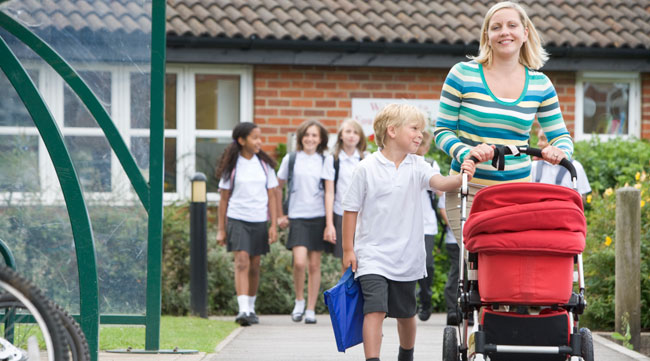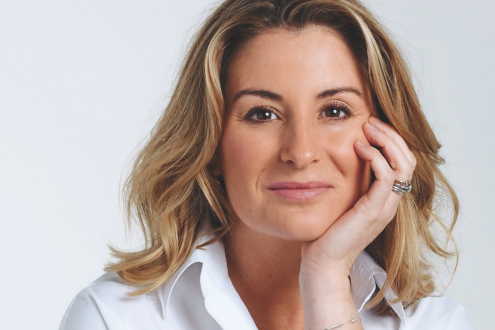Playground politics for adults
Bullying, telling tales and tight-knit cliques are all part of school life — and that’s just the mothers. Clinical psychologist Dr Stephen Briers offers advice on how to navigate the schoolyard

Jemima looks miserable. ‘When I wake up and it’s a school day my heart sinks,’ she says. ‘I just don’t fit in. I know it and they know it…’ So what should Jemima do? Tell a teacher? Talk to a parent?
Unfortunately, Jemima is the parent, and one of a growing number of adults discovering that relations between parents at school can be as disturbingly reminiscent of Lord Of The Flies as those between their offspring. ‘I can’t tell you how much I hate that playground,’ says Liz, mother of Karen, four, and Luke, seven. ‘There are the yummy mummies air-kissing in one corner, while the stay-at-home worthies gaze pityingly at you because you’ve obviously dashed straight out of a meeting to pick up your kids. And if you don’t belong to one of the established clans, you just drift around on the outskirts feeling like a leper.’
The more parents I’ve talked to, the more it’s clear that these experiences, while often taboo, aren’t unique. The stories I’ve heard have more in common with some of the nastier behaviours witnessed between teenage girls — the spreading of rumours, alliance building, back-stabbing, social exclusion and the ignoring of unpopular peers. ‘It’s astonishing how bitchy parents can be about one another,’ says Megan, mother of teenagers Dan and William. ‘Maybe it is something about revisiting your own school days — a sort of mass regression — but it’s hard not to get caught up in it.’
We know that groups of all kinds can exert a powerful undertow on our dealings with each other. Back in 1954, psychologist Muzafer Sherif and colleagues randomly assigned 24 boys to two groups in a camp run at the Robbers Cave State Park in Oklahoma. When, a few days later, the experimenters pitched the ‘Rattlers’ and the ‘Eagles’ (as they had christened themselves) against each other in ‘friendly’ competition, relations between the two gangs rapidly degenerated into something pretty ugly. There was name-calling, repeated raids on the rival camp, and children holding their noses when in contact with members of the other gang. The experimenters feared the boys would come to blows.
As team identity grew stronger, antipathy towards the rival group increased. Yet even though we know that such group dynamics exist, why should school in particular stir up such primal emotions and immature behaviour among adults old enough to rise above it?
At one level, Megan is probably right: the distinctive sights and sounds of the schoolyard may well act as evocative cues of childhood memories, triggering our old patterns of playground conduct.
Yet we’re also more likely to form cliques when we’re anxious — and there are several reasons why our children’s schooldays can leave us feeling vulnerable. For a start, there’s a strong cultural belief that how our children behave reflects directly on our parenting of them. So as our sons and daughters take their first independent steps in such a public forum, we nervously anticipate the judgments that may be passed upon us.
If you let it, the playground can breed paranoia. Under such circumstances, who can blame us for retreating into the familiar huddle of friends who make us feel more secure? Until your child starts school, he or she has probably also moved almost exclusively in circles that reflect your own values and lifestyle choices. But the moment you hand them over in reception, all that changes. Our unconscious, anxiety-ridden realisation that our precious baby is going to be moving among 'them' as opposed to 'us' can lead us to seek out and cling to other parents with whom we feel we have something in common.
Moreover, as the Robbers Cave experiment demonstrates, attacking a rival group is a convenient way to reinforce clan solidarity. Marie, a solicitor and single parent, describes ‘an invisible apartheid’ at her children’s school between the mothers in paid employment and those working in the home. ‘Once, a woman I barely knew came up to me and told me how sorry she felt for me that I was going to miss out on so much of Gracie’s formative years. It was a cruel thing to say, but it was disguised as a considerate comment. I couldn’t have been more taken aback.’
Marie’s experience highlights a key factor that perpetuates the tensions between parents; although undercurrents of anxiety, aggression and resentment exist, they can rarely be publicly owned — and the result is that they are often buried, only to seep out in subtle but nonetheless destructive ways. It is only natural for us to be invested in our children but unspoken competition can easily contaminate parental relationships. While your friend’s child’s excellent SATS results, solo in the school Christmas concert or inclusion in the school football team may afford you genuine pleasure, it is difficult not to feel a stab of jealousy if your own child is struggling.
Similarly, our close identification with our children means we can feel every trivial snub and jibe our kids experience all too keenly, and when another child is making our own miserable it can bring out the raging lioness (or lion) in all of us. At such times, wounded families inevitably close protectively around their respective member, regardless of fault, rallying the support of available friends and peers to their cause. Rumours are spread, clan loyalties invoked and sides taken.
At this point, you may be feeling that it’s easiest to avoid the playground fray altogether. But even this can be a risky strategy, because the quality of our children’s social lives is so tightly bound up with our ability to stay on good terms with their friends’ parents. It is painful for all concerned to discover on the grapevine that your child is the only one not to have been invited to that birthday party. This fundamental dependency can be exploited by those seeking positions of influence within various parental clans.
Author Rosalind Wiseman suggests that at the centre of many such networks you will often find the ‘queen bee mum’ who uses a mix of social intelligence and charm to extend her power base. Embodying the cultural and aspirational ideals of the group, such figures are often revered by their followers but can be highly controlling and ruthless if their dominance is challenged.
Of course, groups can bring out the best in us as well as the worst. Relationships forged between adults during our children’s schooldays often yield true, lasting and supportive friendships and schools can become warm, vibrant communities. However, it may be time we also acknowledged some of the psychological tensions of the playground — it might just be the first step towards making it an emotionally safer environment for both our children and ourselves.









